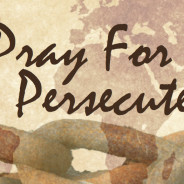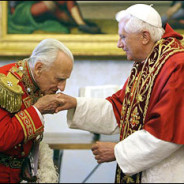Blog
Persecuted Christians
I recently heard a respected priest speak from the pulpit about persecuted Christians being slaughtered in the Middle East, particularly in northern Iraq right now. He prayed that the people would “hold onto their Christian teachings.” The word slaughter, in this case, means the killing of great numbers of human beings, and from what I hear on the news, it is being done in the most awful ways. People have been killing one another for their religious beliefs for a very long time. The end result of this senselessness is, quite obviously, that there are a lot of dead people. Lives are ruined, families are destroyed, society is harmed, the human race is diminished. Our response? “Hold onto your Christian teachings?!” Can we do better than that? It is time for some better advice: STOP KILLING FOR RELIGIOUS REASONS–PERIOD! Here is some more good advice: DON’T DIE FOR YOUR RELIGION! THINK! Religion, in its many different forms, is false. There is no God. There is no evidence of God. When you pray, nothing happens. There are no virgins waiting to have sex with you in heaven. There is no evidence of heaven–or hell for that matter. Your religion isn’t superior to anyone else’s–they all have a false basis. Here is an excerpt from the Boston Globe (Aug. 16, 2014): In a blog post this week, Cardinal Sean P. O’Malley asked Catholics around the world to pray for the people of Iraq. “It is important that we pray for them during this time when so much of the Christian population has been completely displaced and so many people have lost their homes, their families, and even their lives,” he wrote Friday, the same day he celebrated a Mass focused on the Iraqi situation at St. Leonard’s Church in the North End. Last week, Pope Francis condemned the militants’ campaign against religious minorities, which he said left him “in dismay and disbelief.” In his Sunday blessing, he cited “thousands of people, including many Christians, driven from their homes in a brutal manner; children dying of thirst and hunger in their flight; women kidnapped; people massacred; [and] violence of every kind. “All this gravely offends God and humanity. Hatred is not to be carried in the name of God,” he added. “War is not to be waged in the name of God.” Saturday’s Mass in Newton was “a time to give them our support and pray for them and tell them they’re not alone in this country,” said Father Charles J. Higgins of Mary Immaculate of Lourdes, where the Iraqi community often celebrates Mass. Seriously?! We’re going to pray for them and tell them they’re not alone? Wow, that should help. Prayer makes us feel better about doing nothing. It doesn’t do a thing for the people being slaughtered. It would be far better to tell them to abandon their false beliefs and seriously deal with the people trying to kill them. Wasting time praying while someone is breaking through your door is just not a good idea. The real problem is that young people are being taught to intensely believe something that is false. Young people are taking these false beliefs to the extreme and are enforcing what is actually written in their holy book–to kill people who don’t believe as they...
read moreFind God’s Match for You
“Find God’s Match for You.” Every time I hear Christian Mingle’s slogan on the radio, red flags go up in my head. Someone is making a claim that they have a system where God coordinates “matches” or pairings of Christian singles. Here is a little excerpt from The Daily Irritant to get you thinking about this: So God has someone in mind for you. But what, he doesn’t do retail? He needs a middle-man? Man. I’d really like to see Jim and Judy get together, those kids would be perfect for each other, but if I set them up, then I”m going to have to fix up everybody, and who has the time? Plus, last time didn’t work out so great, and I’m never gonna hear the end of that! How is it not offensive to claim that their business is to hook you up with “God’s Match?” Since they are the ones doing the matchmaking, are they not claiming to be God? Is that not blasphemy? Does that not earn you a stoning? Or are they saying that once you pay them your money, then and only then will God reveal unto them the person who is the perfect match for you, and quell surprise! she’s also a Christian Mingle client! And somehow God never recommends anyone who isn’t a client of their company. Just a coincidence, I’m sure. Oh, and one more thing… God is Imaginary, so the whole thing (sweet as it sounds) is a big sham. You might get matched up with someone compatible (and I really hope it works out), but God will not actually have a part in the matching (since he doesn’t exist). It is only one’s wishful thinking that allows one to buy into Christian Mingle’s slogan. Christian Mingle makes a bundle on your wishful thinking–$9.99 to $29.99 per person per month depending on the length of the term for which you sign up. There’s also a $3.99 processing fee when you sign up for the first time. You must pay up-front and in advance for whatever term you sign up for and the term automatically renews (meaning your credit card is automatically charged). God’s finance guy seems pretty shrewd to me. You might have thought God would do it for free… Think about...
read more10 Reasons You Should Never Have a Religion
While consciously pursuing your spiritual development is commendable, joining an established religion such as Christianity, Islam, or Hinduism is one of the worst ways to go about it. In this article I’ll share 10 reasons why you must eventually abandon the baggage of organized religion if you wish to pursue conscious living in earnest. Since Christianity is currently the world’s most popular religion, I’ll slant this article towards Christianity’s ubiquitous failings. However, you’ll find that most of these points apply equally well to other major religions (yes, even Buddhism). 1. Spirituality for dummies. If you have the awareness level of a snail, and your thinking is mired in shame and guilt (with perhaps a twist of drug abuse or suicidal thinking), then subscribing to a religion can help you climb to a higher level of awareness. Your mindset, however, still remains incredibly dysfunctional; you’ve merely swapped one form of erroneous thinking for another. For reasonably intelligent people who aren’t suffering from major issues with low self-esteem, religion is ridiculously consciousness-lowering. While some religious beliefs can be empowering, on the whole the decision to formally participate in a religion will merely burden your mind with a hefty load of false notions. When you subscribe to a religion, you substitute nebulous group-think for focused, independent thought. Instead of learning to discern truth on your own, you’re told what to believe. This doesn’t accelerate your spiritual growth; on the contrary it puts the brakes on your continued conscious development. Religion is the off-switch of the human mind. Leave the mythology behind, and learn to think for yourself. Your intellect is a better instrument of spiritual growth than any religious teachings. 2. Loss of spiritual depth perception. One of the worst mistakes you can make in life is to attach your identity to any particular religion or philosophy, such as by saying “I am a Christian” or “I am a Buddhist.” This forces your mind into a fixed perspective, robbing you of spiritual depth perception and savagely curtailing your ability to perceive reality accurately. If that sounds like a good idea to you, you’ll probably want to gouge out one of your eyeballs too. Surely you’ll be better off with a single, fixed perspective instead of having to consider two separate image streams… unless of course you’ve become attached to stereo vision. Religious “truths” are inherently rooted in a fixed perspective, but real truth is perspective-independent. When you substitute religious teachings for truth, you mistake shadows for light sources. Consequently, you doom yourself to stumble around in the dark, utterly confused. Clarity remains forever elusive, and the best answer you get is that life is one giant mystery. Religious mysteries, however, arise not from what is truly unknowable; they arise from the limitations of trying to understand reality from a fixed frame of reference. A more intelligent approach is to consider reality through a variety of different perspectives without trying to force your perceptions into an artificial religious framework. If you wish to learn more about this approach, read Spiritual Depth Perception. 3. Engineered obedience training. Religions are authoritarian hierarchies designed to dominate your free will. They’re power structures that aim to convince you to give away your power for the benefit of those who enjoy dominating people. When you subscribe to a...
read moreMaster Delusionist
The pastor or priest is the master delusionist. His job is to present a delusion to you, reinforce it constantly, and ask you to pay for his effort. A liar is a delusionist too, but a master delusionist would be one who is very nice to you, speaks in a soft tone, shows restraint and diplomacy when challenged, and may actually believe the delusion he is promoting. Here is an entertaining little exercise: Go to church and, on the bulletin, keep score with little tally marks every time you hear something that is false, unsubstantiable, or a baseless declaration of fact. Try to be as objective as you possibly can be. When you hear something, ask yourself, “Is this true?” If the answer is “no,” put a hash mark. I have done this and it is amazing! Every few seconds, I put down a tally mark. A healing service is delusional thinking and is a basic bait and switch kind of event. I have been to several healing services and have never observed someone being healed. The religious leader, when questioned about this, always says something along the lines of, “We don’t know how God works, or exactly what his will is.” About the best we do is pray for peace about whatever ails us and that somehow makes us feel better. Prayer too is delusional thinking because prayer also does not work. Pray for all cancer to be cured or an amputee’s limb to regenerate. It won’t happen, period. Get your prayer group to offer up the prayer or organize a prayer service to pray about about it. It still won’t happen. “Ask and you shall receive” is false. “Wherever two or more are gathered…” is also false. These things are all part of the delusion offered by the master delusionist–claims that are never...
read moreYour Local Church
Your local church is not interested in walking away from religion. Its parent organization, its pastor, and its people all have vested interests in maintaining the delusion of the existence of God. For the parent organization, whether that might be a conference, a synod, a diocese or whatever, it is truly all about the money. Any church that fails reduces the income of the parent organization. For the pastor, it is huge: his life-work and life-purpose are on the line, not to mention his salary and his retirement benefits. Unpaid church leaders have their own personal identities wrapped up in church. Some get their need to be important fulfilled through their position in the church. Church provides an opportunity to teach and lead, care for others, and have a positive influence on youth. For everyone, church provides a warm comfortable home with loving people who share a common purpose. For the individual, leaving the church can be a painful experience, but it can be done. A person can decide all at once that he or she is through with church and then can do something else. It might be more gradual–a kind of fading away. Church attendance falls off and eventually the weekends are free. Some may choose to continue some affiliation by attending church on major church days like Christmas and Easter. But what about the person whose very identity is connected to the church? The priest, the lifelong Sunday school teacher, the bishop, the pope, the head elder? When one has devoted so much to something they love so much, it is almost impossible for them to tear away, even if they come to realize it is all a sham. Imagine if the pope himself came to realize that all religion is false. Would he declare it to the world and go do something else? NO! His very identity is being the pope. Everything he has worked for his entire life is on the line. Likewise, if your local pastor or priest came to realize the same, would he declare it to the congregation? In all probability, not. He might do one of two things: 1) Keep it to himself and maintain the status quo (I think this happens all the time!). 2) Find a good exit point and leave the ministry (I think this is extremely hard to do.). What would happen if an institution leader were to propose to the institution that they dissolve the organization because its teachings are false? He would be run out of the organization so fast it would make your head spin! In some religions it might be much worse! So the challenging questions are: How do we overcome the intense need for church institutions, leaders, and members to maintain the status quo? For society to advance, is it enough for individuals to leave the church? (That is, considering that individuals leave while the forces of the institutions continue to delude newcomers, propagating religion like a virus.) Assuming that individuals leaving causes churches to fail financially and ultimately to fail in purpose, what should be instituted, if anything, in their place? Is there a way for institutions to CHANGE? Is it possible for a religious institution to ultimately become non-religious? How do we fulfill the needs of people in a...
read moreHouse of Cards
With a house of cards, every card props up the others around it. The house is fragile because the cards are merely leaned against one another. There is no bedrock and no concrete foundation. A house of cards collapses when a card or two is pulled from the bottom. The church is like a house of cards. It has no bedrock beneath it; no concrete foundation. Oh the buildings do, but I’m talking about the very basis for belief. In order for the church to stand, a few foundational premises must stand. 1. Man is inherently sinful and needs salvation. 2. Blood sacrifice is a good way to bring about salvation. 3. There is an afterlife. Let’s look at each one of these: 1. Man is inherently sinful and needs salvation. The creation story of Genesis is a myth. Scientifically, it just doesn’t hold up. Serpents don’t talk. Behavior such as eating an apple or becoming aware of good and evil is not passed down from generation to generation. The earth is far older than the creation story implies. The Catholic church acknowledges that the creation story in Genesis is “figurative,” meaning it didn’t happen like that. It doesn’t tell us what the story means specifically, but we can be sure that there was not an original-sin event. Since we know that behavior is not passed from generation to generation genetically anyway, there cannot be inherent sinfulness. Without original sin, salvation makes no sense. 2. Blood sacrifice is a good way to bring about salvation. We no longer sacrifice animals on the altar as was the custom in biblical days. We have discovered that the only outcome from such practice is that you have a bloody mess of dead animals. At that time, however, people did think that blood sacrifice had benefit. So much so, in fact, that early civilizations sacrificed humans as well as animals. Click here to learn more about human sacrifice. Learning about human sacrifice is important because that’s what the story of Jesus’ dying on the cross is all about. The blood sacrifice of Jesus on the cross would bring about salvation. Serving the “blood of Christ” is all about blood sacrifice. Blood sacrifice is a barbaric early-human activity based on superstition. 3. There is an afterlife. There is simply no evidence of heaven or hell or any other type of afterlife. The Bible, which describes heaven and hell, was written when superstition was at its peak. There was virtually no scientific knowledge at that time. They knew nothing about the solar system within which the Earth lies. They didn’t even know that the earth was round! Today, with all the tools of advanced science, there is still no evidence whatsoever of a spiritual dimension. Let’s step back and assume that the Bible is totally true and let’s summarize the major events: God set up a scenario knowing that man would fall, requiring him to sacrifice himself to himself so that he could forgive the people for falling in the scenario he created. If they believe the story in the book about Jesus with no supporting evidence, they get to live in paradise for eternity. If they are not convinced, he sends them to be tortured by fire in Hell (which he created or somehow...
read moreHealthcare Costs
All the talk about the “Affordable Healthcare Act” or “Obabmacare” (whichever you prefer to call it) makes me question whether the actual problem is being addressed. The current healthcare solution makes health insurance more available and more affordable. What a great thing. If you don’t look any further. I’m not knocking the effort but from my experience, the difficulty in obtaining affordable health insurance is a symptom of a much bigger problem–the cost of healthcare is simply too high. This legislation treats the symptom, not the cause. When my first child was born (1990), the hospital promised us prenatal care and delivery for $4,000. We got the childbirth classes and the free diaper bag. After it was over, they billed the insurance company for $12,000. Upon questioning, they said that the $4,000 was if we paid cash. They had never said this before. This got my wife and I angry, so we requested itemized bills from the hospital. Many items were obviously overpriced and there were many duplicate items as well. Just a few items that I recall–a styrofoam water pitcher $24 (we got one; they charged for two), 2 pints of blood ~$50 each (we used none; they charged for two and explained that it had been reserved for us), Tylenol $6 each, and the list goes on. We complained to the insurance company and provided them with a copy of the agreement for $4,000. The insurance company paid the full $12,000. Two years after the birth we got another explanation of benefits for $4,000 more in charges. We contacted the hospital again and requested an itemized bill. They explained that they were billing for items they had forgotten to bill for originally. We scrutinized the bill carefully and determined that every single item on the bill was a duplicate or triplicate charge from the original list of charges. We contacted the insurance company to tell them not to pay the fraudulent bill. They thanked us for letting them know. They paid it anyway. This one uncomplicated birth should have cost $4,000 but actually cost $16,000. I recently went to my eye doctor (an ophthalmologist) for a routine eye exam with charges of about $100. While there, I inquired about a tag on my eyelid. He offered to remove it saying it would be very simple to do. I agreed. He pulled out what appeared to be medical grade fingernail clippers and in about 3 seconds, removed the tag. He explained that there wasn’t an insurance code for removing a tag, so he would submit another code. Using this code brought him a $400 from the insurance company for a few seconds of time. My friend George had a kidney stone. He did not have insurance. He requested an estimate of charges before going in to have the stone removed. The hospital was very reluctant to provide the estimate; they are much more comfortable when you don’t know the price ahead of time. $50,000! This would have bankrupted the family. Out of necessity, he shopped price and had the same procedure done at a surgery center for $2,400 (yes two thousand, four hundred). These are just three illustrations of the REAL problem–the price of healthcare is too high! Hospitals charge too much; doctors manipulate insurance claims to their...
read moreHis Most Reverend Excellency
I don’t rub shoulders with too many “high-ups” in the Catholic church, but if I did I might be tempted to suggest that they tone down the self-aggrandizing titles. We had a function recently where the person giving the opening prayer was the “Very Reverend _____, Vicar of ____.” I wondered what made him very reverend, and, “wouldn’t any reverend want to be very reverend?” I looked up the Wiki on this and to my irreverent delight I found that one might also aspire to be: “His Most Reverend Excellency“–when he enters, you should stand and remove your hat and you may kiss the sacred ring at the greeting and again at closing . If he is your bishop, you may kneel when kissing the ring (bowing at the waist is also acceptable). You should address him “Your Excellency.” Higher yet on the totem pole is, “His Grace _____.” All the rituals of the hat and kneeling and kissing the ring also apply to “His Grace.” Next would be “His Beatitude” and then “His Emminence,” both with all the rituals of the hat and kneeling and kissing the ring. Last would be “The Sovereign Pontiff, His Holiness _____.” Note that men should wear a dark suit and tie and remove their hats in his presence, while women should wear black dresses and have their heads and arms covered. (White for women is a privilege reserved to Catholic queens and a select few royals.) Stand when he enters a room (until he invites you to sit) and again when he leaves it. When introduced, kneel on your left knee and kiss his ring; repeat before he leaves. Sounds a bit royal to me. I’m sure Jesus would be proud. ...
read moreReligious Education is Bad
Wow, how can religious education be bad?! Almost all educators would agree that teaching critical thinking skills to our students is paramount. Religious education is contrary to that very basic premise of teaching and learning. Religion is false–The world was not created in 6 days. The earth is certainly more that 6,000 years old. Sacrificing a person by killing him on an altar or a cross is pointless. There is no evidence of heaven or hell. Noah couldn’t have built a boat that could contain all the species of the earth and provide the food, temperature, and habitat so those specimens could survive. I could go on and on. The point is, these things are false. In a typical Catholic school, students are required to take a full-year religion class every year. A common response to an objection to this is, “You could just consider it a ‘history of religion’ class.” Even if one were to consider this a history class, consider that this consumes one class period per day, every single day of a young person’s education. In our local Catholic school, there are 7 class periods per day. One of those class periods is religion. Thus religion fully consumes 1/7 of the child’s day. But, it is more time consuming than just that. There are prayer services, masses, discussions about the masses, prayer in every class, opportunities for confession, religious retreats, etc. Altogether religious education and influence consumes at least 20% of the time and possibly as much as 25%. This is huge and this is damaging. It is damaging because it is false. If our objective is to educate, we must be very careful to teach things that are true. A child may take a religion class that teaches creationism while taking a science class that teaches evolution. We teach contradictory information in the same school. Creationism is easy to destroy academically because there is no evidence to support it. The official position of the Catholic church is that the creation story is just that, a story; evolution is scientific fact. From my experience, the official position does little to dissuade zealous religion teachers from teaching fundamentalist religion anyway. If this were not bad enough, there is little time left to teach the actual content the student needs to know. I have been involved in many academic competitions. Quite often, religious schools compete with private academies. The academies tend to beat the religious schools. Why? Because they spend more time on mathematics, science, biology, physics–actual science. If religion consumes 25% of the time, 75% is left for actual academics. Students from competing schools can spend 100% of the time on academics. This places religious students at a tremendous disadvantage in the competition. More importantly, it places them at a disadvantage in life–for all the same reasons. The good news is that religious education is in decline because people are smarter now than ever before. They do not have to rely on the wisdom of the priest. Information about every imaginable topic is available on the Internet. A simple search in Google, “God is false” or “bible false,” will yield a plethora of information that would keep an apologist busy for weeks trying to counter....
read moreIt’s About the Money!
What does religion cost me? A lot! The money you give to the church is money out of your pocket and into your pastor’s. Your church’s biggest budget items are likely to be the pastor’s salary and the building. If your church is larger, there might be a second pastor or possibly other staff too. As you become a core member of the church, you will feel increasing pressure to give more and more. Trust me, I know firsthand. If I asked you to give me 10% of your gross income, would you have questions of me? “What are you going to do with it?” “What kind of return should I expect?” If I lie to you, would you cut off the money? You should. It doesn’t “come back to you ten-fold.” That is a false claim by some churches. Step back and ask yourself, “Does my pastor make more money than I do?” “Does he or she live in a better house?” “Is my pastor’s retirement plan better than mine?” If you are of the belief that your pastor is more deserving than you, you are wrong–he or she is flim-flamming you. Here is an entertaining little video that illustrates how focused on money some churches and clergy are: Notice at the end how the elders throw the first few dollars onto the steps to get people started throwing their money at the feet of the pastor. Clever? Manipulative? You decide. So maybe that’s an extreme. No…some pastors/churches are simply more sophisticated about fleecing you. If you feel good about giving money to the church, you have been successfully fleeced; you have been taken advantage of. Here is an article about how wealthy the Catholic church is: How Rich Is the Catholic Church? I have seen firsthand the opulence of some of the churches in Europe. The use of parishioner’s money to guild a cathedral with silver and gold is an absolute disgrace. To a lesser degree, but the some theme nonetheless, churches in the U.S. today are palaces compared to the typical poverty rhetoric. The Vatican Billons It really is about the money. It’s about getting YOUR money!...
read more











Recent Comments